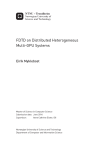Download Treats and Tricks, or use SimGrid - USS SimGrid
Transcript
Treats and Tricks, or use SimGrid
Martin Quinson
SimGrid User Days 2010, Cargese
Outline
Wannabe User Manual
Configuring and Installing
Configuring your simulators
Trace Replay
Some “Do not ...” advices
The bindings
Java
Lua
Ruby
Surviving in C
Conclusion
Martin Quinson
Treats and Tricks, or use SimGrid
2/26
How to install the tool
In release 3.3.4 and before
I
Grab it: https://gforge.inria.fr/project/showfiles.php?group_id=12
I
./configure && make && sudo make install
In release 3.4 and afterward
I
Grab it; cmake . && make && sudo make install-simgrid
Get it from SVN
I
svn checkout svn://scm.gforge.inria.fr/svn/simgrid/simgrid/trunk simgrid
I
cd simgrid
I
cmake . && make && sudo make install-simgrid
From autotools to cmake
I
So, yeah, we moved from autoconf to cmake for release 3.4
It offers a better user interface, with ccmake (demo)
I
If allows for software quality dashboards (demo)
I
Martin Quinson
Treats and Tricks, or use SimGrid
Wannabe User Manual
3/26
Configuring your simulators
Every simulator using SimGrid accepts a set of options
- -help: get some help (demo)
- -help-models: long help on models (3.4-only; demo)
- -log: configure the verbosity
- -cfg: change some settings
Note: SMPI-specific settings, are only visible in SMPI simulators
The log argument
I
It’s similar to Log4J, but in C
I
You can increase the amount of output for some specific parts of SimGrid
I
Example: See everything by using –log=root.thres:debug (demo)
I
List of all existing channels: doc/html/group XBT log cats.html
Martin Quinson
Treats and Tricks, or use SimGrid
Wannabe User Manual
4/26
Trace Replay: Separate your applicative workload
C code
static void action_blah(xbt_dynar_t parameters) { ... }
static void action_blih(xbt_dynar_t parameters) { ... }
static void action_bluh(xbt_dynar_t parameters) { ... }
int main(int argc, char *argv[]) {
MSG_global_init(&argc, argv);
MSG_create_environment(argv[1]);
MSG_launch_application(argv[2]);
/* No need to register functions as usual: actions started anyway */
MSG_action_register("blah", blah);
MSG_action_register("blih", blih);
MSG_action_register("bluh", bluh);
MSG_action_trace_run(argv[3]); // The trace file to run
}
Deployment
<?xml version=’1.0’?>
<!DOCTYPE platform SYSTEM "simgrid.dtd">
<platform version="2">
<process host="Tremblay" function="toto"/>
<process host="Jupiter" function="tutu"/>
<process host="Fafard" function="tata"/>
</platform>
Martin Quinson
Treats and Tricks, or use SimGrid
Trace file
tutu
toto
tutu
toto
blah
blih
bluh
blah
toto 1e10
tutu
12
12
Wannabe User Manual
5/26
Trace Replay (2/2)
Separating the trace of each process
I
Because it’s sometimes more convinient (for MPI, you’d have to merge them)
I
Simply pass NULL to MSG action trace run()
I
Pass the trace file to use as argument to each process in deployment
<?xml version=’1.0’?>
<!DOCTYPE platform SYSTEM "simgrid.dtd">
<platform version="2">
<process host="Tremblay" function="toto">
<argument value="actions_toto.txt"/>
</process>
<process host="Jupiter" function="tutu">
<argument value="actions_tutu.txt"/>
</process>
</platform>
Action Semantic
I
I
This mecanism is completely agnostic: attach the meaning you want to events
In examples/actions/action.c, we have pre-written event functions for:
I
I
Martin Quinson
Basics: send, recv, sleep, compute
MPI-specific: isend, irecv, wait, barrier, reduce, bcast, allReduce
Treats and Tricks, or use SimGrid
Wannabe User Manual
6/26
SimGrid is not a Simulator
Input
Parameters
Simulator
stats
Application
Applicative
Workload
logs
Simulation Kernel
visu
Platform
Topology
Availibility
Changes
Application
Deployment
Scenario
Outcomes
That’s a Generic Simulation Framework
Martin Quinson
Treats and Tricks, or use SimGrid
Wannabe User Manual
7/26
Outline
Wannabe User Manual
Configuring and Installing
Configuring your simulators
Trace Replay
Some “Do not ...” advices
The bindings
Java
Lua
Ruby
Surviving in C
Conclusion
Martin Quinson
Treats and Tricks, or use SimGrid
Wannabe User Manual
8/26
Do not mix results between releases!
Main issue: The events order does change
I
I
I
I
I
Models don’t change, only the order of events occuring at the same time
It may/will change your application’s behavior if
In a master/slaves sending tasks in a round/robin
In a scheduling algorithm considering the ready tasks in order
In almost every application, actually
Why that?
I
I
I
We improve the data structure used for future event set
We sort the events to not traverse the ones which cannot be done yet
We do lazy evaluation
Side note
I
I
When this happens, there is a big fat warning in the ChangeLog
(you should read it anyway, don’t wait for the next SUD to get infos)
Optimistic note
I
I
The MSG interface not changed since 2002 (backward compatibility)
At least with MSG USE DEPRECATED
Martin Quinson
Treats and Tricks, or use SimGrid
Wannabe User Manual
9/26
Do not use the <cluster> tag
But you got it already, right?
I
We know the issue, will fix it at some point
Martin Quinson
Treats and Tricks, or use SimGrid
Wannabe User Manual
10/26
Stop using MSG task put / MSG task get! Now!
Solving the rendez-vous issues in task exchanges
I
MSG have a strange interaface somehow mimicking BSD sockets ports
I
I
I
I
You send to host:port, as in BSD
but 2 people could send to the same (which is somehow ok)
and 2 people could get from the same (which is annoying)
Now, we have a much cleaner interface, based on mailboxes
Mailboxes
I
Mailboxes are represented by a string (whatever you would like)
I
You send stuff to a mailbox; you receive stuff from a mailbox
I
Where in network the sender and receiver are do not matter for rendez-vous
I
The communication timings of course take their locations into account
I
This makes the user code ways easier
I
I know that the examples were not all updated yet, sorry
Read examples/msg/masterslave/masterslave mailbox.c, ignore others
I
Martin Quinson
Treats and Tricks, or use SimGrid
Wannabe User Manual
11/26
The cleaner Master/Workers in MSG with mailboxes
The master has a large number of tasks to dispatch to its workers for execution
int master(int argc, char *argv[ ]) {
int number_of_tasks = atoi(argv[1]);
double task_comm_size = atof(argv[3]);
char mailbox[80];
int i;
double task_comp_size = atof(argv[2]);
int workers_count = atoi(argv[4]);
char buff[64];
/* Dispatching (dumb round-robin algorithm) */
for (i = 0; i < number_of_tasks; i++) {
sprintf(buff, "Task_%d", i);
task = MSG_task_create(sprintf_buffer, task_comp_size, task_comm_size, NULL);
sprintf(mailbox,"worker-%d",i % workers_count);
INFO2("Sending %̈s¨ to mailbox %̈s¨
", task->name, mailbox);
MSG_task_send(task, mailbox);
}
/* Send finalization message to workers */
INFO0("All tasks dispatched. Let’s stop workers");
for (i = 0; i < workers_count; i++) {
sprintf(mailbox,"slave-%ld",i % slaves_count);
MSG_task_send(MSG_task_create("finalize", 0, 0, 0), mailbox);
}
INFO0("Goodbye now!"); return 0;
}
Martin Quinson
Treats and Tricks, or use SimGrid
Wannabe User Manual
12/26
The MSG master/workers example: the worker
int worker(int argc, char *argv[ ]) {
m_task_t task;
int id = atoi(argv[1]);
char mailbox[80];
int errcode;
sprintf(mailbox,"worker-%d",id);
while(1) {
errcode = MSG_task_receive(&task, mailbox);
xbt_assert0(errcode == MSG_OK, "MSG_task_get failed");
if (!strcmp(MSG_task_get_name(task),"finalize")) {
MSG_task_destroy(task);
break;
}
INFO1("Processing ’%s’", MSG_task_get_name(task));
MSG_task_execute(task);
INFO1("’%s’ done", MSG_task_get_name(task));
MSG_task_destroy(task);
}
INFO0("I’m done. See you!");
return 0;
}
Martin Quinson
Treats and Tricks, or use SimGrid
Wannabe User Manual
13/26
The MSG master/workers example: deployment file
Specifying which agent must be run on which host, and with which arguments
XML deployment file
<?xml version=’1.0’?>
<!DOCTYPE platform SYSTEM "surfxml.dtd">
<platform version="2">
<!-- The master process (with some arguments) -->
<process host="Tremblay" function="master">
<argument value="6"/>
<!-- Number of tasks -->
<argument value="50000000"/> <!-- Computation size of tasks -->
<argument value="1000000"/> <!-- Communication size of tasks -->
<argument value="3"/>
<!-- Number of workers -->
</process>
<!-- The
<process
<process
<process
worker process
host="Jupiter"
host="Fafard"
host="Ginette"
(argument: mailbox number to
function="worker"><argument
function="worker"><argument
function="worker"><argument
use) -->
value="0"/></process>
value="1"/></process>
value="2"/></process>
</platform>
Thanks to mailboxes, the master don’t have to know where the slaves live
(nor the contrary)
Martin Quinson
Treats and Tricks, or use SimGrid
Wannabe User Manual
14/26
The MSG master/workers example: the main()
Putting things together
int main(int argc, char *argv[ ]) {
MSG_global_init(&argc,argv);
/* Declare all existing agent, binding their name to their function */
MSG_function_register("master", &master);
MSG_function_register("worker", &worker);
/* Load a platform instance */
MSG_create_environment("my_platform.xml");
/* Load a deployment file */
MSG_launch_application("my_deployment.xml");
/* Launch the simulation (until its end) */
MSG_main();
INFO1("Simulation took %g seconds",MSG_get_clock());
}
Martin Quinson
Treats and Tricks, or use SimGrid
Wannabe User Manual
15/26
Outline
Wannabe User Manual
Configuring and Installing
Configuring your simulators
Trace Replay
Some “Do not ...” advices
The bindings
Java
Lua
Ruby
Surviving in C
Conclusion
Martin Quinson
Treats and Tricks, or use SimGrid
The bindings
16/26
The bindings
Some people don’t like coding in C
I
We have some Java bindings since 2008 at least
I
We have some Lua bindings
I
We have some Ruby bindings
Why these languages?
I
Every potential intern knows Java (I guess)
I
Lucas (the office next to mine) is a very effective Ruby lobbyist
I
Lua is said to allow very efficient bindings with C
“Will you add my favorite language?”
I
We could, but it’s rather time consuming (threading mess, at least)
I
I’m not willing to start a collection here (Medhi’s time is limited)
⇒ Patch welcome (and I wish you good luck; we see it in next SUD)
Martin Quinson
Treats and Tricks, or use SimGrid
The bindings
17/26
The bindings
Some people don’t like coding in C
I
We have some Java bindings since 2008 at least
I
We have some Lua bindings since March 23. 2010
I
We have some Ruby bindings since ... April 7. 2010
Why these languages?
I
Every potential intern knows Java (I guess)
I
Lucas (the office next to mine) is a very effective Ruby lobbyist
I
Lua is said to allow very efficient bindings with C
“Will you add my favorite language?”
I
We could, but it’s rather time consuming (threading mess, at least)
I
I’m not willing to start a collection here (Medhi’s time is limited)
⇒ Patch welcome (and I wish you good luck; we see it in next SUD)
Martin Quinson
Treats and Tricks, or use SimGrid
The bindings
17/26
Master/slaves in Java (1/2)
import simgrid.msg.*;
public class BasicTask extends simgrid.msg.Task {
public BasicTask(String name, double computeDuration, double messageSize) {
super(name, computeDuration, messageSize);
}
}
public class FinalizeTask extends simgrid.msg.Task {
public FinalizeTask() {
super("finalize",0,0);
}
}
public class Worker extends simgrid.msg.Process {
public void main(String[ ] args)
throws TransferFailureException, HostFailureException,
TimeoutException, TaskCancelledException {
String id = args[0];
while (true) {
Task t = Task.receive("worker-" + id);
if (t instanceof FinalizeTask)
break;
BasicTask task = (BasicTask)t;
Msg.info("Processing ’" + task.getName() + "’");
task.execute();
Msg.info("’" + task.getName() + "’ done ");
}
Msg.info("Received Finalize. I’m done. See you!");
}
}
Martin Quinson
Treats and Tricks, or use SimGrid
The bindings
18/26
Master/slaves in Java (2/2)
import simgrid.msg.*;
public class Master extends simgrid.msg.Process {
public void main(String[ ] args) throws MsgException {
int numberOfTasks = Integer.valueOf(args[0]).intValue();
double taskComputeSize = Double.valueOf(args[1]).doubleValue();
double taskCommunicateSize = Double.valueOf(args[2]).doubleValue();
int workerCount = Integer.valueOf(args[3]).intValue();
Msg.info("Got "+
workerCount + " workers and " + numberOfTasks + " tasks.");
for (int i = 0; i < numberOfTasks; i++) {
BasicTask task = new BasicTask("Task_" + i ,taskComputeSize,taskCommunicateSize);
task.send("worker-" + (i % workerCount));
Msg.info("Send completed for the task " + task.getName() +
" on the mailbox ’worker-" + (i % workerCount) + "’");
}
Msg.info("Goodbye now!");
}
}
The rest of the story
I
No need to write the glue (thanks to Java introspection)
I
The XML files are exactly the same (beware of capitalization for deployment)
I
Output very similar too
Martin Quinson
Treats and Tricks, or use SimGrid
The bindings
19/26
Master/slaves in Lua (1/2)
function Master(...)
nb_task = arg[1];
comp_size = arg[2];
comm_size = arg[3];
slave_count = arg[4]
-- Dispatch the tasks
for i=1,nb_task do
tk = simgrid.Task.new("Task "..i,comp_size,comm_size);
alias = "slave "..(i%slave_count);
simgrid.info("Master sending ’" .. simgrid.Task.name(tk) .."’ To ’" .. alias .."’");
simgrid.Task.send(tk,alias);
simgrid.info("Master done sending ’".. simgrid.Task.name(tk) .."’ To ’" .. alias .."’");
end
-- Sending Finalize Message To Others
for i=0,slave_count-1 do
alias = "slave "..i;
simgrid.info("Master: sending finalize to "..alias);
finalize = simgrid.Task.new("finalize",comp_size,comm_size);
simgrid.Task.send(finalize,alias)
end
end
Some more polishing is needed
I
We’d prefer tk:send(alias) instead of simgrid.Task.send(tk,alias)
Martin Quinson
Treats and Tricks, or use SimGrid
The bindings
20/26
Master/slaves in Lua (2/2)
The slave
function Slave(...)
local my_mailbox="slave "..arg[1]
while true do
local tk = simgrid.Task.recv(my_mailbox);
if (simgrid.Task.name(tk) == "finalize") then
simgrid.info("Slave ’" ..my_mailbox.."’ got finalize msg");
break
end
simgrid.Task.execute(tk)
end
simgrid.info("Slave ’" ..my_mailbox.."’: I’m Done . See You !!");
end
Setting up your experiment
require "simgrid"
simgrid.platform("my_platform.xml")
simgrid.application("my_deployment.xml")
simgrid.run()
simgrid.info("Simulation’s over.See you.")
simgrid.clean()
Martin Quinson
Treats and Tricks, or use SimGrid
The bindings
21/26
Master/slaves in Ruby (1/2)
Some mandatory headers
require ’simgrid’
include MSG
The master
class Master < MSG::Process
def main(args)
numberOfTask = Integer(args[0])
taskComputeSize = Float(args[1])
taskCommunicationSize = Float(args[2])
slaveCount = Integer(args[3])
for i in 0..numberOfTask-1
task = Task.new("Task_"+ i.to_s, taskComputeSize , taskCommunicationSize);
mailbox = "slave " + (i%slaveCount).to_s
MSG::info("Master Sending "+ task.name + " to " + mailbox)
task.send(mailbox)
MSG::info("Master Done Sending " + task.name + " to " + mailbox)
end
for i in 0..slaveCount-1
mailbox = "slave " + i.to_s
finalize_task = Task.new("finalize",0,0)
finalize_task.send(mailbox)
end
end
end
Martin Quinson
Treats and Tricks, or use SimGrid
The bindings
22/26
Master/slaves in Ruby (2/2)
The slave
class Slave < MSG::Process
def main(args)
mailbox = "slave " + args[0]
while true
task = Task.receive(mailbox)
if (task.name == "finalize")
break
end
task.execute
MSG::debug("Slave ’" + mailbox + "’ done executing task "+ task.name + ".")
end
MSG::info("I’m done, see you")
end
end
Setting up your experiment
MSG.createEnvironment("platform.xml")
MSG.deployApplication("deploy.xml")
MSG.run
puts "Simulation time : " + MSG.getClock .to_s
MSG.exit
Some more polishing is needed
I
Exceptions on timeout/host failure and so on?
Martin Quinson
Treats and Tricks, or use SimGrid
The bindings
23/26
MSG bindings: performance
What about performance loss for Java?
(Warning: these values are 2 years old)
XXX
XXXworkers
100
XXX
tasks
X
1,000
native
.16
java
.41
10,000
native
.48
java
1.6
100,000
native
3.7
java
14.
1,000,000
native
36.
java 121.
500
1,000
5,000
10,000
.19
.59
.52
1.9
3.8
13.
37.
130.
.21
.94
.54
2.38
4.0
15.
38.
134.
.42
7.6
.83
13.
4.4
29.
41.
163.
0.74
27.
1.1
40.
4.5
77.
40.
200.
I
Small platforms: ok
I
Larger ones: not quite. . .
What about the others?
I
It’s too recent, I didn’t had time to rerun the full benchs
Very preliminary results for Master/slaves (10 slaves; 200,000 tasks):
I That’s improvable
C (native)
7s
I It’s garbage-collected
Lua
10.5s
Ruby
45s
I User stack is dynamic in lua&ruby(?)
Java
47s
⇒ better scalability?
I
Martin Quinson
Treats and Tricks, or use SimGrid
The bindings
24/26
XBT from 10,000 feets
C is a basic language: we reinvented the wheel for you
Logging support: Log4C
Advanced data structures
XBT_LOG_NEW_DEFAULT_CATEGORY(test,
"my own little channel");
XBT_LOG_NEW_SUBCATEGORY(details, test,
"Another channel");
INFO1("Value: %d", variable);
CDEBUG3(details,"blah %d %f %d", x,y,z);
I
I
I
Hash tables (Perl’s ones)
Dynamic arrays, FIFOs
SWAG (don’t use); Graphs
String functions
Exception support
xbt_ex_t e;
TRY {
block
} CATCH(e) {
block /* DO NOT RETURN FROM THERE */
}
Debugging your code
I
I
Ctrl-C once: see processes’ status
Press it twice (in 5s): kill simulator
xbt backtrace display current()
Backtrace (displayed in thread 0x90961c0):
---> In master() at masterslave_mailbox.c:35
---> In ?? ([0x4a69ba5])
I
I
I
Threading support
I
I
Treats and Tricks, or use SimGrid
Portable wrappers (Lin, Win, Mac, Sim)
Synchro (mutex, conds, semaphores)
Other
I
I
I
I
Martin Quinson
bprintf: malloc()ing sprintf
trim, split, subst, diff
string buffers
Mallocators
Configuration support
Unit testing (check src/testall)
Integration tests (tesh: testing shell)
Surviving in C
25/26
Conclusion: Finding the documentation
Martin Quinson
Treats and Tricks, or use SimGrid
Conclusion
26/26
Conclusion: Finding the documentation
User manuals are for wimps
I
Real Men read some slides ’cause they are more concise
I
They read the examples, pick one modify it to fit their needs
I
They may read 2 or 5% of the reference guide to check the syntax
I
In doubt, they just check the source code
Martin Quinson
Treats and Tricks, or use SimGrid
Conclusion
26/26
Conclusion: Finding the documentation
User manuals are for wimps
I
Real Men read some slides ’cause they are more concise
I
They read the examples, pick one modify it to fit their needs
I
They may read 2 or 5% of the reference guide to check the syntax
I
In doubt, they just check the source code
lusers don’t read the manual either
I
Proof: that’s why the RTFM expression were coined out
I
Instead, they always ask same questions to lists, and get pointed to the FAQ
Martin Quinson
Treats and Tricks, or use SimGrid
Conclusion
26/26
Conclusion: Finding the documentation
User manuals are for wimps
I
Real Men read some slides ’cause they are more concise
I
They read the examples, pick one modify it to fit their needs
I
They may read 2 or 5% of the reference guide to check the syntax
I
In doubt, they just check the source code
lusers don’t read the manual either
I
Proof: that’s why the RTFM expression were coined out
I
Instead, they always ask same questions to lists, and get pointed to the FAQ
So, where is all SimGrid documentation?
I
The SimGrid tutorial is a 200 slides presentation
(motivation, models, example of use, internals)
I
Almost all features of UAPI are demoed in an example (coverage testing)
I
The reference guide contains a lot in introduction sections (about XBT)
I
The FAQ contains a lot too (installing, visu, XML, exotic features)
I
The code is LGPL anyway
Martin Quinson
Treats and Tricks, or use SimGrid
Conclusion
26/26











































